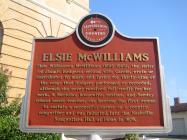Inscription
Front
Elsie Williamson McWilliams (1896-1985), the sister of Jimmie Rodgers's second wife Carrie, wrote or contributed to music and lyrics for thirty-nine of the songs that Rodgers performed or recorded, although she never received full credit for her work. A Meridian housewife, mother, and Sunday school music teacher, she became the first woman to sustain a successful career as a country songwriter and was inducted into the Nashville Songwriters Hall of Fame in 1979.
Rear
Elsie McWilliams After growing up in Harperville in Scott County, Nettie Williamson McWilliams, called "Elsie" (1896-1985) moved to Meridian where she wrote songs, made music, and tended her family for most of her 89 years. Her musical career would likely have been limited to playing pump organ in church and writing songs for her children school plays if her sister Carrie had not married a local railroad brakeman and singer named Jimmie Rodgers in 1920. When Rodgers achieved global popularity and was pressed by his manager and publisher Ralph Peer to supply a steady stream of new songs, Jimmie drafted his music-reading, songwriting sister-in-law Elsie to pitch in with the writing.
McWilliams tended to modestly credit songs only to Rodgers on the grounds that they would not have existed if he hadn?t asked her to help. Rodgers, his publisher, and his record label Victor saw to it, however, that her name appeared as co-writer or lyric writer on nineteen of his recorded songs. By her own later estimate, she also contributed to some twenty others.
Her lyrics for Jimmie Rodgers were sometimes sparked by events from her own life. "My Little Lady," which would become a cowboy yodeling standard recorded by Roy Rogers and many others, was inspired by a neighbor of the McWilliamses named "Hadie;" the rhyme stuck. Others were based on facts from The Singing Brakeman's own life. "You and My Old Guitar" was based on an excited comment he made to Mrs. Rodgers.
Many of McWilliams creations were sentimental, domestic songs in the melodic style of the Tin Pan Alley songs she loved—"Daddy and Home," "Lullaby Yodel," "Home Call," "Mississippi Moon," and also Rodgers single gospel number, "The Wonderful City." Yet she was the principle author of lively songs like the risqu? "Everybody Does It in Hawaii" and "My Little Lady," and of broken marriage songs like "I?m Lonely and Blue" and "Never No Mo? Blues," and she contributed to the "rounder" number "My Rough and Rowdy Ways." After Rodgers early death, she continued to write verse and songs throughout her life, including several for Ernest Tubb.
Elsie McWilliams devoted most of her time to her husband, Edwin "Dick" McWilliams, who for most of their over sixty years of marriage was a patrolman with the Meridian police department, her three children, and civic duties. But she also performed, playing piano and singing in Jimmie Rodgers first pop-oriented dance band trio in 1923, and appearing occasionally at clubs and festivals in the last ten years of her life.
Details
| HM Number | HM1GNR |
|---|---|
| Series | This marker is part of the Mississippi: Mississippi Country Music Trail series |
| Tags | |
| Marker Number | 3 |
| Year Placed | 2010 |
| Placed By | He Mississippi Country Music Trail, U.S. DOT(FHA), & MS DOT. |
| Marker Condition | No reports yet |
| Date Added | Thursday, October 2nd, 2014 at 6:20am PDT -07:00 |
Pictures
Locationbig map
| UTM (WGS84 Datum) | 16S E 340207 N 3582162 |
|---|---|
| Decimal Degrees | 32.36500000, -88.69838333 |
| Degrees and Decimal Minutes | N 32° 21.9', W 88° 41.903' |
| Degrees, Minutes and Seconds | 32° 21' 54" N, 88° 41' 54.18" W |
| Driving Directions | Google Maps |
| Area Code(s) | 601 |
| Which side of the road? | Marker is on the right when traveling South |
| Closest Postal Address | At or near 2000-2098 5th St, Meridian MS 39301, US |
| Alternative Maps | Google Maps, MapQuest, Bing Maps, Yahoo Maps, MSR Maps, OpenCycleMap, MyTopo Maps, OpenStreetMap |
Is this marker missing? Are the coordinates wrong? Do you have additional information that you would like to share with us? If so, check in.
Nearby Markersshow on map
Show me all markers in: Meridian, MS | Lauderdale County | 39301 | Mississippi | United States of America
Maintenance Issues
- What historical period does the marker represent?
- What historical place does the marker represent?
- What type of marker is it?
- What class is the marker?
- What style is the marker?
- This marker could use another picture or two.
- Can this marker be seen from the road?
- Is the marker in the median?


Comments 0 comments